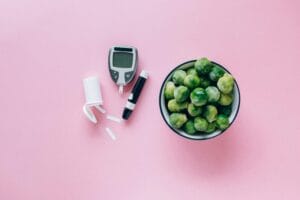FREE SHIPPING OVER $50
Natural Ways to Ease Ulcerative Colitis Flare-Ups
Ulcerative colitis flare-ups can be painful, frustrating, and disruptive to your daily life. You may feel like you have no control over your condition and that nothing you do can help. But don’t lose hope! There are several natural ways to ease ulcerative colitis flare-ups and improve your quality of life. In this blog post, we will explore some of the best natural remedies for ulcerative colitis, such as diet, supplements, stress management, and more. We will also share some tips on how to prevent or reduce the frequency of flare-ups and how to cope with them when they happen. For those who are newly diagnosed or have been living with ulcerative colitis for a long time, you can benefit from these natural approaches to ulcerative colitis flare-ups.
Understanding Ulcerative Colitis Flare-Ups

Ulcerative colitis is a chronic inflammatory bowel disease that causes ulcers and inflammation in the lining of your colon and rectum. It can be a painful and debilitating condition that affects your quality of life. Flare-ups are episodes of heightened colitis symptoms. But how do you know when you are having a flare-up of ulcerative colitis? What are the signs and symptoms that indicate your disease is active and needs medical attention?
Colitis Symptoms
A flare-up of ulcerative colitis is a period of increased disease activity that causes worsening of your symptoms. Flare-ups can vary in severity and duration, depending on the extent and location of your inflammation, as well as your response to treatment. Some common ulcerative colitis flare-up symptoms include:
- Abdominal pain and cramping
- Diarrhea, sometimes with blood or mucus
- Urgency and frequency of bowel movements
- Loss of appetite and weight loss
- Fatigue and weakness
- Fever and chills
- Joint pain and swelling
- Skin rashes and mouth ulcers
Not everyone with ulcerative colitis experiences the same symptoms or the same intensity of symptoms. Some people may have mild or occasional flare-ups, while others may have severe or frequent flare-ups that interfere with their daily activities. Some people may also have periods of remission, when their symptoms are minimal or absent.
Factors that contribute to Colitis flare-ups
The triggers of ulcerative colitis flare-ups are not fully understood, but some factors that may contribute to them include:
- Stress
- Infections
- Medications
- Food intolerances
- Smoking
- Hormonal changes
If you notice any changes in your symptoms or suspect that you are having a flare-up of ulcerative colitis, you should contact your doctor as soon as possible. Early diagnosis and treatment can help you manage your condition and prevent complications such as dehydration, malnutrition, anemia, colon damage, and colon cancer.
Ulcerative Colitis Flare-Up Treatment
You know how frustrating and painful it can be to deal with ulcerative colitis flare-ups. They can disrupt your daily life, affect your mood, and make you feel helpless. But you don’t have to suffer in silence. There are natural ways to ease your symptoms and prevent future flare-ups. Here are some of the best ulcerative colitis flare-up treatment options that you can try today.
Colitis Diet: What to Eat and What to Avoid
One of the most important factors in managing your ulcerative colitis is your diet. What you eat can either trigger or soothe your inflammation. That’s why you need to follow a colitis diet that suits your needs and preferences. A colitis diet is not a one-size-fits-all solution. It may vary depending on your symptoms, triggers, and tolerance. However, there are some general guidelines that you can follow to optimize your digestive health.
Some of the foods that you should eat more of include:
- Lean proteins, such as chicken, fish, eggs, and tofu
- Low-fiber fruits and vegetables, such as bananas, applesauce, carrots, and potatoes
- Healthy fats, such as olive oil, avocado, and nuts
- Probiotic foods, such as yogurt, kefir, and sauerkraut
- Bone broth, which can help heal your gut lining and reduce inflammation
Some of the foods that you should avoid or limit include:
- High-fiber foods, such as whole grains, beans, and raw fruits and vegetables
- Dairy products, especially if you are lactose intolerant
- Spicy foods, which can irritate your colon
- Caffeine, alcohol, and carbonated drinks, which can dehydrate you and worsen your diarrhea
- Processed foods, such as chips, cookies, and fast food, which can contain additives and preservatives that can trigger inflammation
Natural Remedies and Supplements
In addition to following a colitis diet, you can also try some natural remedies and supplements that can help ease your ulcerative colitis flare-ups. These include:
- Aloe vera juice can soothe your colon and reduce inflammation.
- Turmeric has anti-inflammatory and antioxidant properties that may help improve gut health.
- Ginger can help with nausea, cramps, and bloating.
- Chamomile tea, can calm your nerves and relax your muscles.
- Fish oil contains omega-3 fatty acids that can reduce inflammation and improve your immune system.
- Curcumin is the active ingredient in turmeric and has potent anti-inflammatory effects.
- Boswellia is a resin from a tree that has anti-inflammatory and analgesic properties.
Before taking any supplements or herbs, make sure to consult with your doctor first. Some of them may interact with your medications or cause side effects. Also, remember that these are not substitutes for your prescribed ulcerative colitis treatment. They are meant to complement your conventional therapy and enhance your quality of life.
Seeking Support and Help
Living with ulcerative colitis can be challenging and isolating. You may feel depressed or anxious about your condition. But you are not alone. There are millions of people who share your struggles and understand what you are going through. You can find support and help from various sources, such as:
- Family and friends, who can offer you emotional and practical support.
- A doctor and health care team, who can provide you with medical advice and treatment options.
- A therapist or counselor, who can help you cope with your feelings and thoughts.
- Support groups and online communities, where you can connect with other people who have ulcerative colitis and learn from their experiences.
Colitis Flare-Up Recovery Time
Ever wonder how long does a colitis flare-up lasts and what factors affect your recovery time for it? The truth is, there is no simple answer to these questions. Colitis flare-ups can vary in severity, duration, and frequency depending on many factors, such as your medication, diet, stress level, lifestyle, and genetics.
The average colitis flare-up recovery time may range from around 4 to 6 weeks, but it can be shorter or longer depending on the severity of your inflammation and how well you respond to treatment. Some people may experience mild symptoms that subside within a few days, while others may have more severe or persistent symptoms that require hospitalization or surgery. In some cases, colitis flare-ups can become chronic and last for months or even years.
The best way to reduce your colitis flare-up recovery time is to follow your doctor’s advice and take your medication as prescribed. Medication can help reduce inflammation, control pain, prevent infection, and heal ulcers in your colon. Some common medications for colitis include anti-inflammatory drugs, corticosteroids, immunosuppressants, and biologics. You may also need to take antibiotics if you have an infection or probiotics to restore the balance of your gut bacteria.
Before You Leave
Ulcerative colitis is a lifelong condition that requires ongoing care and monitoring. By learning to recognize your symptoms, you can take steps to control your disease and improve your well-being. We hope our guide has been of help to you on your journey. Feel free to learn more about the colitis diet as we go more in-depth in our next post.
Remember, you are not alone in this journey. There are many resources and support groups available to help you cope with ulcerative colitis flare-ups. Be sure to leave a comment if you have more questions.
For those considering surgical options we’ll leave a YouTube video below that goes in-depth about a patient’s recovery from ulcerative colitis.



